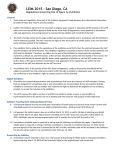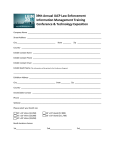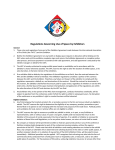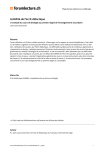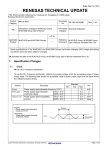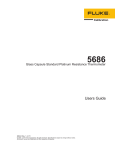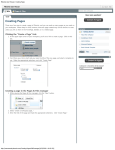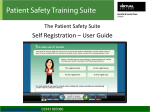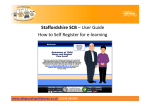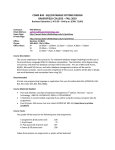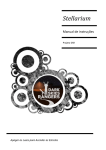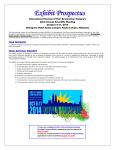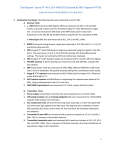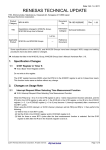Download Spring 2010 - hum2232renaissancebaroque
Transcript
Course Syllabus1 - HUM 2230 Humanities – Fifteenth-to-Twentieth Centuries (online course) Section 315385 Spring 2010 Semester Revised Saturday, January 09, 2010 Monday, January 11 – Friday, May 07, 2010 (17-Week Course) Note: I may be required to change either the syllabus or course schedule (or both) at any time during the semester (see “Announcements” in Blackboard for changes). Instructor: John E. Bardakjy, B. A. (History), M. A. (Classics) E-mail: [email protected] 2 Office hours: N/A3 Credit Hours: Three (3) 1 Please use the syllabus in conjunction with the “Calendar” and “Discussion” functions in Blackboard to track all due dates and scheduled “virtual” meetings (as applicable). 2 This is my primary e-mail for the course. I will attempt to respond to e-mail messages within twenty-four (24) hours or sooner, depending on the circumstances. I will also be able to receive and respond to e-mails via my Blackberry device. 3 Since this is an online course, I do not have office hours at FSCJ per se. Students with questions may reach me using my FSCJ e-mail address. In addition, I am available for scheduled chat sessions through Blackboard, or audio/video conferencing through Skype (please email me at [email protected] to schedule a “virtual” meeting with me). I will be available M, TR, and F evenings (8.00-10.00 PM) this semester. Note – I expect everybody to schedule at least one 15-minute meeting with me during the first four [4] weeks of the course, so be sure to start contacting me to begin scheduling meetings. I will be unavailable for virtual office hours March 08-12, March 19, 2010, and April 26-30, 2010). Office hours, like everything else, are subject to change. HUM 2230 (315385), Spring 2010 (17-Week Course) Page 1 of 11 Textbook: Benton, J. R., and R. DiYanni. (Paperback).4 Arts and Culture, Volume II (3rd Edition) Online Resources: 1. PBworks5 a. http://hum2232renaissancebaroque.pbworks.com/ b. http://hum2234enlightenmentromanticism.pbworks.com/ c. http://hum2250twentiethcentury.pbworks.com/ 2. Skype:6 http://www.skype.com/ a. Audio conferencing b. Teleconferencing Prerequisites: Successful (i.e., “C” or better) completion of ENC 1101 or ENC 1101H Course Description: This course consists of the study of life and creative expressions from their origins in the Italian Renaissance through the modern day as surveyed through the visual arts, music, literature, philosophy, and social history. The course examines the interaction of cultural experiences that developed and were passed on to later cultures. This course provides a foundation for study of all Humanities courses; it also includes specific reading and writing competencies. Note: This particular HUM 2310 section is an “online” course (i.e., it depends on the Internet for the delivery and exchange of information). Blackboard (http://bb.fccj.edu) is the Internet-based learning system used to manage this section. If you have questions about using any of the function, consult the online Blackboard User Manual. 4 I will not be using the textbook this semester. Although the text is adequate as Humanities textbooks go, it is expensive, and I have found excellent substitutes (in the form of online articles and resources) for the book. Feel free to keep the book if you have already purchased it, or return it for a refund. The textbook is optional; I will not be referring to it this semester. 5 PBworks serves as a repository for online resources and/or academic journal articles associated with specific discussion topics. The “catalog” is open to students for browsing and downloading articles of interest. The more complex discussion topics will include links to articles deemed “required reading.” PBworks registration is free. 6 Skype provides a free service to facilitate instructor-teacher conference calls or studentstudent communication. Registration and the Skype download are free. HUM 2230 (315385), Spring 2010 (17-Week Course) Page 2 of 11 Course Objectives: Thinking critically about the Humanities primarily, but not exclusively, within the context of the fifteenth through twentieth centuries Valuing and appreciating the influence of the Renaissance and Early Modern Europe on the Enlightenment, Romanticism, and Twentieth Century art, literature, philosophy, and politics Communicating opinions on the assigned readings through persuasive and wellconstructed discussion postings Acting by applying the ideas, concepts, and skills learned to other classes Learning how to use Blackboard to access documents and posting discussion topics on the assigned readings Learning how to document research materials using MLA Documentation LEARNING OUTCOMES: After completing this course the learner will: Comprehend the nature, origins, and contributions of major Western civilizations from the Renaissance through the Twentieth Century Comprehend the contributions of the arts and humanities to the human experience Understand religious, philosophical and cultural systems of Western Europe and their effects on society Show curiosity and openness to new ideas with regards to the course contents Specific Learning Objectives: Specific learning objectives are found at the beginning of each chapter in the book. Use the objectives to identify what the chapter will cover and what you should know when you are finished reading. In a very real sense, this is much like skimming the headlines of a newspaper before you delve into a particular story. The objectives provide you with a basic framework for learning and understanding; however, do not limit your knowledge or interest to the objectives. General Requirements Blackboard This class requires Blackboard access (http://bb.fccj.edu) to access/download all relevant documents (e.g., the syllabus, online texts, journal articles, etc.) and access various functions (announcements, discussion board, and learning modules, assessments, etc.). Students will also use Blackboard to complete all activities for the class. Note: Blackboard user names and passwords should be the same as Artemis IDs and passwords. Students should contact FSCJ Learner Support Center at (904) 632-3151 with any questions. HUM 2230 (315385), Spring 2010 (17-Week Course) Page 3 of 11 Textbook The following textbook is optional for the course: Benton, J. R., and R. DiYanni. Arts and Culture, Volume II (3rd Edition) (Paperback) I will not be referring to the textbook for any of the course exercises; it remains, however, a valuable resource, and if you can afford to keep it as a reference source, then retain it in your possession. Otherwise, return it for a refund. I will be using a number of online resources, functions, and activities (e.g., PBworks and/or other resources, such as Skype) in lieu of using an actual textbook. Please use the reading schedule page within the Syllabus to confirm which texts to read at what point during the semester. Course Organization This HUM 2210 course section consists of six (6) chapters: Ch 1 2 3 4 5 6 Title Introduction The Renaissance Baroque/Early Modern Europe The Enlightenment Romanticism The Late Nineteenth Century The Twentieth Century Length 1-2 Weeks 4 Weeks 3 Weeks 2 Weeks 2 Weeks 2 Weeks 3 Weeks Availability January 11-24 Jan 11-Feb 07 February 08-28 March 01-14 March 15-28 March 29-April 11 April 12-May 07 Total Value 05.0% 25.0% 20.0% 10.0% 10.0% 10.0% 20.0% 100% All discussion topics and assessments associated with a particular “chapter” are due by the end of a chapter’s availability period. Following the conclusion of a chapter, all activities associated with that particular chapter will no longer be available. Students are expected to complete a minimum number of discussion topics per chapter: Ch Title 1 2 3 4 5 6 Introduction The Renaissance Baroque/Early Modern Europe The Enlightenment Romanticism The Late Nineteenth Century The Twentieth Century # Topics 1 5+ 5+ 5+ 5+ 5+ 5+ Total HUM 2230 (315385), Spring 2010 (17-Week Course) Required 1 4 3 2 2 2 2 16 Page 4 of 11 Grading Students will have the opportunity to complete the number of activities necessary to earn a specific grade for the course. This “cafeteria-style” grading system provides students with flexibility in the event that they encounter unforeseen problems during the semester. This system also provides students with the opportunity to complete additional work if the need arises due to the varying degree of individual performances and/or personal issues. Students are not required to complete every topic made available for a given chapter. Grading is based on the number of points earned by students for each chapter (i.e., the combined number of points from all six chapters). The possible total number of points for each chapter is far greater than the actual points required by students to achieve grade objectives. Topics, especially the non-Sirius topics, vary in worth according to their complexity; complexity depends on the amount of readings involved when generating a response to a given topic. Topics of lesser value generally involve less reading; topics of greater value will require reading the texts, lecture notes, and assigned articles, as well as posting comparative analyses of ideas, theories, and facts as they pertain to the topic in question. HUM 2230 (315385), Spring 2010 (17-Week Course) Page 5 of 11 Grading Scale Introduction (05%): Grade A B C D F Points 90-100 80-89 70-79 60-69 <59 Ch 01: Renaissance (25%): Grade A B C D F Points 360-400 320-359 280-319 240-279 <239 Ch 02: Baroque (20%): Grade A B C D F Points 270-300 230-269 200-229 180-199 <179 Ch 03: Enlightenment (10%): Grade A B C D F Points 180-200 160-179 140-159 120-139 <119 Ch 04: Romanticism (10%): Grade A B C D F Points 180-200 160-179 140-159 120-139 <119 Ch 05: Nineteenth Century (10%): Grade A B C D F Points 180-200 160-179 140-159 120-139 <119 Ch 06: Twentieth Century (20%): Grade A B C D F Points 270-300 230-269 200-229 180-199 <179 Total: (100%) – 17 Weeks Grade A B C D F Points 1,530-1,700 1,360-1,529 1,190-1,359 1.020-1,189 < 1019 HUM 2230 (315385), Spring 2010 (17-Week Course) Page 6 of 11 Reminder - If you miss a discussion posting, move onto the next scheduled activity – never ask to “make up” work. I have specifically designed the course to mitigate the consequences of “unforeseen” events/circumstances resulting in missed postings. However, students who fail to post in one (1) chapter cannot make up opportunities lost by completing all postings in another chapter. Each chapter is self-contained; students with zero points in any given chapter undermine their chances to earn their grade objective for the course. Notes 1. All students are required to post a response under the “Orientation Discussion Topic” for attendance verification purposes by January 24, 2010, 11.30 PM Note: This is a mandatory activity for the purposes of taking attendance; students who do not post to this topic will be dropped from the course effective immediately. 2. This course also consists of a number of assessments; while optional, students are encouraged to take assessments to increase overall point totals. TECHNOLOGY REQUIREMENTS: An AMD or Pentium processor and at minimum a 56kbs Internet connection. Please use the following checklist to determine your computer readiness. You should own or have access to Computer with personal access to the Internet (e.g., computer with a modem or cable modem connection) An e-mail account Web-browser software--at least Internet Explorer 5.0, Firefox 2.0 or above and Safari 3.1 Windows XP or Vista or higher operating system (or MAC OS X or higher) Virus-checking software Word-processing software Plug-ins including Acrobat Reader, Flash Player, and Quicktime Additional hardware including speakers and microphone Technical Issues Students experiencing technical issues related to Blackboard should: Visit the FSCJ Learner Support Center online at the following URL address: http://www.distancelearning.org/learnersupport/ Call the FSCJ Learner Support Center's at (904) 632-3151 or toll-free at (877) 633-5950 Fax the FSCJ Learner Support Center at (904) 633-5955 (the toll-free fax is 1-888-873-1145) E-mail the FSCJ Learner Support Center at [email protected] HUM 2230 (315385), Spring 2010 (17-Week Course) Page 7 of 11 Visit the FSCJ Learner Support Center in person at 601 W. State St., Room 312, Jacksonville, Florida 32202 Consult the Blackboard User Manual (in Blackboard) Note: Please do not contact me with Blackboard-related problems. Although I can create pages and populate fields in Blackboard, I cannot perform diagnostics or tell you how/why Blackboard functions as it does. Attendance and Participation All students are required to post a response under the “Orientation Discussion Topic” for attendance verification purposes by January 24, 2010 (11.30 PM) Note: This is a mandatory activity for the purposes of taking attendance; students who do not post to this topic will be dropped from the course the following Monday. Florida Community College Handbook Withdrawal Policy I will withdraw (at the beginning of Week 03) students who fail to post a response to the “Orientation” topic, which will be available the first week of the semester (the topic will be accessible up to January 24, 2010 - 11.30 PM). I also reserve the right to drop students who do not keep up with the scheduled activities and assessments. Miscellaneous Discussion Postings When you post/respond to discussion topics, be sure to maintain a “professional” tone. Furthermore, be especially considerate when responding to any of the questions/responses posted by your fellow students. Finally, use proper grammar, spelling, and syntax when posting topics; mistakes undermine the credibility of whatever it is that you are trying to say. Note: I will check posting dates when responses by one student is very similar in both form and content to one of their colleague’s postings; plagiarizing will not be tolerated, and the consequences will be severe. E-mail I expect everyone to communicate with me via my FSCJ e-mail address ([email protected]). Note: If/when you e-mail me about a topic, be sure to include the name of the course (e.g., “HUM 2230”), as well as the course section (e.g., 315385), in your e-mail’s “Subject” line (so I will know who you are, and the specific course in which you are enrolled). When you e-mail either your colleagues or me, please be sure to maintain a “professional” tone (as you would when posting discussions). Be especially sensitive when responding to any of the questions/statements sent by your fellow students. HUM 2230 (315385), Spring 2010 (17-Week Course) Page 8 of 11 FREQUENTLY ASKED QUESTIONS FOR FSCJ STUDENTS 1. What learning management system is used at FSCJ for the online portions of this course? This course is delivered in the Blackboard® online course platform. 2. Where do I acquire the required texts and instructional materials for this course? JB – this class does not require a textbook. Students will need Internet connectivity to download all materials and complete all activities. 3. Do I have to have Internet access at home? The College can provide you with Internet access (no ISP needed). You may choose to use your own ISP; however, the college’s ISP services are free to enrolled students. The College also has many student computer labs available to students who wish to use them. 4. What if I need special accommodations to take the course? If you require specific accommodations to complete this course, contact Services for Students with Disabilities at www.fccj.edu/resources/disabilities/index.html and notify your instructor. 5. What is in the Book, CD, and Course Shell? JB – the course shell contains links to all resources and activities. 6. How long will I have to wait for a response from the instructor to my email or message? Faculty responds to e-mails and messages within 48 hours. 7. What is proper e-mail/message etiquette? E-mail/messages to other learners and the instructor need to be addressed in a manner appropriate to polite interactions. 8. What will help me succeed in this course? Strong discipline and desire to succeed. You will need to login to class often during the typical week, motivating yourself to meet the requirements for success. Ability to work well independently. You will develop the support of fellow learners all taking the same coursework together, but it will be different from a typical classroom environment. If you work well independently, your chance of success is higher. HUM 2230 (315385), Spring 2010 (17-Week Course) Page 9 of 11 Computer savvy. If you are not familiar with the Internet and email/message communication, we recommend that you take a computer enrichment class prior to enrolling in this course. Faculty assumes you know how to access and send data on the Internet. 9. What are “I” grades and when are they used? An “I” grade may be assigned at the instructor’s discretion upon request by the student to permit the student time to complete required course work, which s/he was prevented from completing in a timely way due to nonacademic reasons. The instructor may require the student to document the request to assist in the decision. The instructor may choose not to grant the request. The “I” grade should be considered only when the student has the potential to earn a passing grade if the missing work is made up. The instructor shall prescribe in a written agreement with the student the remaining course work required for completion and removal of the “I” grade. A copy of this agreement will be kept on file in the office of the appropriate dean. All work must be completed within the first eight weeks of the subsequent term, unless the instructor agrees to a longer timeframe extension of time (not to exceed one year). When the work is completed, the instructor will submit a grade change form with the grade earned. If the work is not completed within the prescribed timeframe, the “I” will automatically change to an “F” grade. The student will be informed of the final grade assigned. To be eligible for an “I” grade, the student must be passing the course at the time of the request, and must have completed at least 75 percent of the course work. 10. What is the FSCJ Code of Ethics? Consistent with The Code of Ethics of the Education Profession in Florida, 6B-1.06, Principles of Professional conduct for the Education Profession in Florida, an obligation to the learner requires that an individual shall not harass or discriminate against any learner on the basis of race, color, religion, sex, age, national or ethnic origin, political beliefs, marital status, handicapping condition, sexual orientation, or social and family background and shall make reasonable effort to assure that each learner is protected from harassment or discrimination. 11. What about academic dishonesty? Academic dishonesty, in any form, is expressly prohibited by the rules of the District Board of Trustees of Florida State College at Jacksonville. Academic dishonesty incorporates the following: Cheating which is defined as the giving or taking of any information or material with the intent of wrongfully aiding oneself or another in academic work considered in the determination of a course grade. HUM 2230 (315385), Spring 2010 (17-Week Course) Page 10 of 11 Plagiarism, which is defined as the act of stealing or passing off as one’s own work the words, ideas, or conclusions of another as if the work submitted were the product of one’s own thinking rather than an idea or product, derived from another source. Any other form of inappropriate behavior which may include but is not limited to falsifying records or data; lying; unauthorized copying, tampering, abusing or otherwise unethically using a computer or other stored information; and, any other act of misconduct which may reasonably be deemed to be a part of this heading. Any student alleged to have committed any act of academic dishonesty as defined herein shall be entitled to due process as defined in District Board of Trustees’ Rule 6Hx7-2. 18 prior to the administration of disciplinary action, including suspension and dismissal. 12. May I repeat this course? Learners repeat a course in an attempt to improve a grade previously earned. State Board Rule 6A-14.0301 limits such attempts to courses where a “D,” “F,” or “FN” grade was earned. A learner has only three total attempts in any course, including the original grade, repeat grades, and withdrawals. Upon the third attempt in a course, the learner must be given an “A,” “B,” “C,” “D” or “F.” When students repeat a course at Florida State College, only the last grade earned is calculated in their cumulative grade point average (GPA). However, students with an excessive number of “W” or “FN” grades and students who repeat courses to improve their GPA may jeopardize their admission to programs in the Florida State University System (SUS) or other institutions. Conclusion Please be sure to note the instructions, availability periods, and due dates for all discussion topics and assessments. Although students may choose when they wish to study for a given week, the due dates for all types of activities have already been set, and will not change. Students who miss due dates for the discussion postings or assessments in particular chapters will not be able to make up the work, and consequently will not receive credit for that particular activity. Please make sure that this does not happen to you; I want everyone to do well in this class. Students, however, can only do well if they read all of the instructions for this course and complete/submit at the very least the minimum number of postings in a timely manner. Good luck, and please feel free to e-mail me with any questions. John Bardakjy, [email protected] Humanities Instructor, FSCJ HUM 2230 (315385), Spring 2010 (17-Week Course) Page 11 of 11












